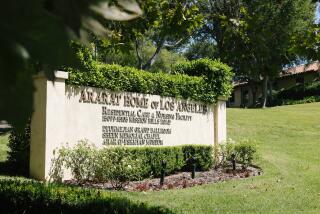Two clinics affiliated with 1-800-GET-THIN are told to improve
An independent accreditation group has told two outpatient clinics affiliated with the once-prominent 1-800-GET-THIN Lap-Band surgery advertising campaign to make specified improvements or potentially lose their accreditation.
The Joint Commission, one of a handful of organizations authorized by California to accredit the state’s outpatient surgery centers, issued “requirements for improvement” to New Life Surgery Center in Beverly Hills and Valley Surgical Center in West Hills after inspecting the facilities in May and again this month.
After the second inspection, the Joint Commission noted nine areas in which the Beverly Hills clinic needed to make improvements and eight at the West Hills clinic, said Bret Coons, a commission spokesman. The areas included infection prevention, leadership and medication management, Coons said in an email.
“Failure to comply with standards and make the necessary improvements can result in an adverse accreditation decision, which ultimately can lead to the denial of either organization’s accreditation,” Coons said in an email to The Times.
The Joint Commission conducted unannounced inspections of the Beverly Hills and West Hills clinics “as a result of information we received about these organizations,” said Elizabeth Eaken Zhani, a Joint Commission spokeswoman. “The information included allegations relating to patient safety.”
After the May inspection, the Joint Commission requested that the West Hills clinic make improvements in 11 areas and that the Beverly Hills clinic improve in 10 areas. The accrediting group made follow-up inspections of both clinics this month and reduced those areas to eight and nine respectively, Coons said.
Five patients died after Lap-Band procedures at the clinics — three in Beverly Hills, two in West Hills — from 2009 to 2011, according to lawsuits, autopsy reports and other public records.
Both clinics are affiliated with 1-800-GET-THIN, a marketing firm that advertised Lap-Band surgeries on Southern California freeway billboards, radio, television and the Internet. The company pulled most of the advertisements this year after receiving a warning from the Food and Drug Administration. The FDA said the ads were misleading because they failed to include adequate warnings about the risks of the surgery.
Konrad Trope, an attorney who represents the surgery centers and 1-800-GET-THIN, said in an email that he expects both clinics will retain their accreditation and the Joint Commission’s “gold seal of approval.”
“The Joint Commission discovered that many of the requirements for improvement from their [May] visit lacked merit, and the purpose of the recent visit was to confirm which requirements for improvement would be dropped,” Trope said. “The surveyor at the last visit confirmed the high standards kept at both New Life and Valley Surgical Center and that the center meets the highest standards.”
Coons said he could not confirm or deny whether the inspector made such a statement.
Trope said it is not uncommon for medical facilities to receive orders to make improvements from accreditation organizations. Several other Southern California facilities “have more requirements for improvement than New Life or West Hills,” he said.
“Requirements for improvement are not health code violations. They are part of a continuous quality improvement process that all facilities under [Joint Commission] administration must undergo,” Trope said.
Kathryn Trepinski, an attorney who represents the family of a patient who died after Lap-Band surgery at the Beverly Hills facility, said the Joint Commission’s inspections and directives for improvement are “long overdue.”
“My client and I are pleased to see the Joint Commission’s increased role in oversight activity,” she said. “The Joint Commission needs to explain why this is a ‘gold seal’ facility.”
Manufactured by Allergan Inc. of Irvine, the Lap-Band is a silicone ring that is surgically implanted around the stomach to discourage overeating. Allergan said this year that it had stopped selling the device to any facilities affiliated with 1-800-GET-THIN.
More to Read
Inside the business of entertainment
The Wide Shot brings you news, analysis and insights on everything from streaming wars to production — and what it all means for the future.
You may occasionally receive promotional content from the Los Angeles Times.











